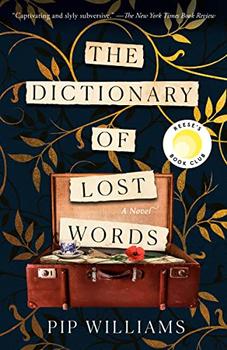Summary | Excerpt | Reading Guide | Reviews | Beyond the Book | Readalikes | Genres & Themes | Author Bio

May 1887
Scriptorium. It sounds as if it might have been a grand building, where the lightest footstep would echo between marble floor and gilded dome. But it was just a shed, in the back garden of a house in Oxford.
Instead of storing shovels and rakes, the shed stored words. Every word in the English language was written on a slip of paper the size of a postcard. Volunteers posted them from all over the world, and they were kept in bundles in the hundreds of pigeon-holes that lined the shed walls. Dr. Murray was the one who named it the Scriptorium—he must have thought it an indignity for the English language to be stored in a garden shed—but everyone who worked there called it the Scrippy. Everyone but me. I liked the feel of Scriptorium as it moved around my mouth and landed softly between my lips. It took me a long time to learn to say it, and when I finally did nothing else would do.
Da once helped me search the pigeon-holes for scriptorium. We found five slips with examples of how the word had been used, each quotation dating back little more than a hundred years. All of them were more or less the same, and none of them referred to a shed in the back garden of a house in Oxford. A scriptorium, the slips told me, was a writing room in a monastery.
But I understood why Dr. Murray had chosen it. He and his assistants were a little like monks, and when I was five it was easy to imagine the Dictionary as their holy book. When Dr. Murray told me it would take a lifetime to compile all the words, I wondered whose. His hair was already as grey as ash, and they were only halfway through B.
Da and Dr. Murray had been teachers together in Scotland long before there was a scriptorium. And because they were friends, and because I had no mother to care for me, and because Da was one of Dr. Murray's most trusted lexicographers, everyone turned a blind eye when I was in the Scriptorium.
The Scriptorium felt magical, like everything that ever was and ever could be had been stored within its walls. Books were piled on every surface. Old dictionaries, histories and tales from long ago filled the shelves that separated one desk from another, or created a nook for a chair. Pigeon-holes rose from the floor to the ceiling. They were crammed full of slips, and Da once said that if I read every one, I'd understand the meaning of everything.
In the middle of it all was the sorting table. Da sat at one end, and three assistants could fit along either side. At the other end was Dr. Murray's high desk, facing all the words and all the men who helped him define them.
We always arrived before the other lexicographers, and for that little while I would have Da and the words all to myself. I'd sit on Da's lap at the sorting table and help him sort the slips. Whenever we came across a word I didn't know, he would read the quotation it came with and help me work out what it meant. If I asked the right questions, he would try to find the book the quotation came from and read me more. It was like a treasure hunt, and sometimes I found gold.
"This boy had been a scatter-brained scapegrace from his birth." Da read the quotation from a slip he had just pulled out of an envelope.
"Am I a scatter-brained scapegrace?" I asked.
"Sometimes," Da said, tickling me.
Then I asked who the boy was, and Da showed me where it was written at the top of the slip.
"Ala-ed-Din and the Wonderful Lamp," he read.
When the other assistants arrived I slipped under the sorting table.
"Be quiet as a mouse and stay out of the way," Da said.
It was easy to stay hidden.
At the end of the day I sat on Da's lap by the warmth of the grate and we read "Ala-ed-Din and the Wonderful Lamp." It was an old story, Da said. About a boy from China. When I asked if there were others, he said there were a thousand more. The story was like nothing I had heard, nowhere I had been, and no one I knew of. I looked around the Scriptorium and imagined it as a genie's lamp. It was so ordinary on the outside, but on the inside full of wonder. And some things weren't always what they seemed.
Excerpted from The Dictionary of Lost Words by Pip Williams. Copyright © 2021 by Pip Williams. All rights reserved. No part of this excerpt may be reproduced or reprinted without permission in writing from the publisher.
The only real blind person at Christmas-time is he who has not Christmas in his heart.
Click Here to find out who said this, as well as discovering other famous literary quotes!
Your guide toexceptional books
BookBrowse seeks out and recommends the best in contemporary fiction and nonfiction—books that not only engage and entertain but also deepen our understanding of ourselves and the world around us.